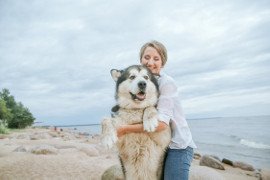Brandon Forder
 One of the biggest components to human interaction is touch. From hugs to high fives, positive physical contact is an essential part of our makeup as it helps us connect with others on a much deeper level. Considering our skin is the largest organ in the human body, it makes sense that positive touch would be so important to our overall well-being.
One of the biggest components to human interaction is touch. From hugs to high fives, positive physical contact is an essential part of our makeup as it helps us connect with others on a much deeper level. Considering our skin is the largest organ in the human body, it makes sense that positive touch would be so important to our overall well-being.
When we engage in positive touch, our bodies release oxytocin, a hormone that makes us feel good. From the moment a baby is born, one of the most important things they need right away is touch. Without positive touch in our lives, our bodies go through a series of physiological changes that may have a detrimental impact on everything from stress levels, quality of sleep, appetite, and more.
Touch Starvation, also known as touch deprivation or skin hunger, is a very real condition that affects millions of people around the globe. As humans, physical touch from other humans is a big part of our biological architecture. From hugging and holding hands, to a simple handshake or pat on the shoulder, these acts of contact help reduce stress and increase a feeling of meaningfulness. Positive touch has the power to reduce production of the stress hormone cortisol, which in turn reduces blood pressure and heart rate.
Because of COVID-19 the number of people suffering from touch starvation has inflated on a massive scale. For several months now, much of the global population has been practising social distancing and isolation, and it is limiting our capacity to have positive touch in our lives. Those at the highest risk of touch starvation include seniors, and those living with disabilities or illnesses.
Luckily, our pets can help prevent or reduce issues related to touch starvation without compromising virus-safety protocols.
Companion animals, such as dogs, cats, and even horses, are an excellent mechanism for soothing the symptoms of touch starvation. Symptoms of touch starvation include anxiety and depression, elevated stress, low relationship satisfaction, and more. Under current pandemic conditions, our beloved companion animals are available for touch without restrictions. Even the simple act of petting a cat or snuggling with a dog for a few minutes can set off a cascade of positive benefits to our mental well-being.
While research on human-animal interactions is relatively new, it’s a field that has been expanding rapidly over the last several years. Researchers have found the positive effects that come from interactions between humans and non-humans are increased based on the strength of their bond. While petting a dog is good for your health, petting your dog is even better.
For those suffering from loneliness and isolation, dogs and cats make for excellent companions. Although they do require more basic care than cats, dogs are known as man’s best friend for a reason. They are very present animals, commonly offering undivided affection and touch for prolonged periods of time. Cats, on the other hand, tend to offer affection and touch on their terms, and often spend their spare time napping.
Our pets are our best friends because of the unconditional love and affection they give us. And during these uncertain times, having a companion like this is invaluable to both our physical and mental health. So, the next time you feel a little bit of touch deprivation creeping up, your pets provide the perfect antidote.
Brandon Forder, known as The Pet Expert, is vice-president of Canadian Pet Connection, an industry leader in healthy pet lifestyles. Brandon holds multiple certifications in pet nutrition, and has more than twenty-five years’ experience specializing in pet health and behaviour. He has written hundreds of informative pet-related articles for newspapers, magazines, radio, and the popular Ask the Pet Expert Blog. Brandon is highly skilled in pet problem solving, and enjoys teaching others about smart and responsible pet ownership. To learn more, visit www.CanadianPetConnection.ca.











